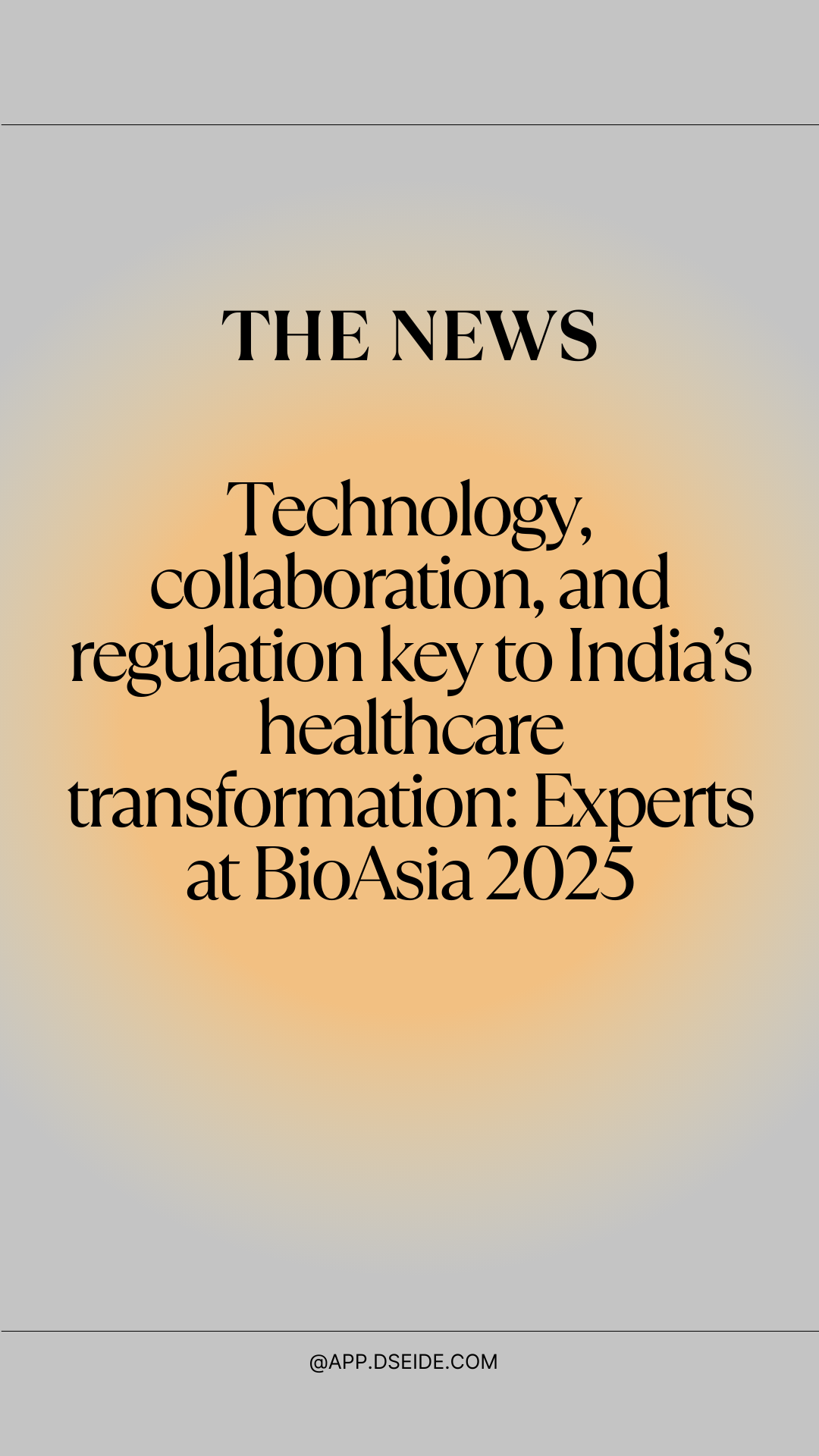The future of India’s healthcare landscape hinges on an integrated approach that blends technology, regulation, and equitable access, highlighted experts at a panel discussion during BioAsia 2025 in Hyderabad on Wednesday.
The discussion, titled ‘Integrated Healthcare and Patient Outcomes’ featured experts from the medical, regulatory, and technology sectors, who advocated for a holistic and data-driven transformation of India’s healthcare system.
Dr. Sangita Reddy, Joint Managing Director of Apollo Hospitals, underscored the urgent need to move from a ‘sick-care’ model to a proactive healthcare system that prioritises preventive care, early detection, and personalised treatment. “We have spent years treating illnesses, but true healthcare lies in keeping people healthy. Predictive analytics, AI-driven risk assessment, and universal health records will be game changers,” she said
The future of India’s healthcare landscape hinges on an integrated approach that blends technology, regulation, and equitable access, highlighted experts at a panel discussion during BioAsia 2025 in Hyderabad on Wednesday.
The discussion, titled ‘Integrated Healthcare and Patient Outcomes’ featured experts from the medical, regulatory, and technology sectors, who advocated for a holistic and data-driven transformation of India’s healthcare system.
Panelists also pointed to India’s alarming healthcare infrastructure deficit as a major barrier to integrated healthcare. With only 0.5 hospital beds per thousand people in urban areas, access remains a challenge, particularly for the country’s vast rural population.
Dr. Samantha Atkinson, Executive Vice President at NSF Health Sciences and former Chief Quality and Access Officer at MHRA, U.K., stressed that robust data interoperability and regulatory frameworks are essential for a well-functioning integrated system. “Data is key. If we have one record of truth rather than fragmented silos, healthcare efficiency will vastly improve,” she said, citing the UK’s ongoing digital transformation in healthcare.
Source- The Hindu
#BioAsia2025 #HealthcareInnovation #TechInHealthcare #HealthcareTransformation #IndiaHealthcare #CollaborationForHealth #DigitalHealth #MedTech #RegenerativeMedicine #HealthcareRegulation #HealthTechIndia
The discussion, titled ‘Integrated Healthcare and Patient Outcomes’ featured experts from the medical, regulatory, and technology sectors, who advocated for a holistic and data-driven transformation of India’s healthcare system.
Dr. Sangita Reddy, Joint Managing Director of Apollo Hospitals, underscored the urgent need to move from a ‘sick-care’ model to a proactive healthcare system that prioritises preventive care, early detection, and personalised treatment. “We have spent years treating illnesses, but true healthcare lies in keeping people healthy. Predictive analytics, AI-driven risk assessment, and universal health records will be game changers,” she said
The future of India’s healthcare landscape hinges on an integrated approach that blends technology, regulation, and equitable access, highlighted experts at a panel discussion during BioAsia 2025 in Hyderabad on Wednesday.
The discussion, titled ‘Integrated Healthcare and Patient Outcomes’ featured experts from the medical, regulatory, and technology sectors, who advocated for a holistic and data-driven transformation of India’s healthcare system.
Panelists also pointed to India’s alarming healthcare infrastructure deficit as a major barrier to integrated healthcare. With only 0.5 hospital beds per thousand people in urban areas, access remains a challenge, particularly for the country’s vast rural population.
Dr. Samantha Atkinson, Executive Vice President at NSF Health Sciences and former Chief Quality and Access Officer at MHRA, U.K., stressed that robust data interoperability and regulatory frameworks are essential for a well-functioning integrated system. “Data is key. If we have one record of truth rather than fragmented silos, healthcare efficiency will vastly improve,” she said, citing the UK’s ongoing digital transformation in healthcare.
Source- The Hindu
#BioAsia2025 #HealthcareInnovation #TechInHealthcare #HealthcareTransformation #IndiaHealthcare #CollaborationForHealth #DigitalHealth #MedTech #RegenerativeMedicine #HealthcareRegulation #HealthTechIndia
The future of India’s healthcare landscape hinges on an integrated approach that blends technology, regulation, and equitable access, highlighted experts at a panel discussion during BioAsia 2025 in Hyderabad on Wednesday.
The discussion, titled ‘Integrated Healthcare and Patient Outcomes’ featured experts from the medical, regulatory, and technology sectors, who advocated for a holistic and data-driven transformation of India’s healthcare system.
Dr. Sangita Reddy, Joint Managing Director of Apollo Hospitals, underscored the urgent need to move from a ‘sick-care’ model to a proactive healthcare system that prioritises preventive care, early detection, and personalised treatment. “We have spent years treating illnesses, but true healthcare lies in keeping people healthy. Predictive analytics, AI-driven risk assessment, and universal health records will be game changers,” she said
The future of India’s healthcare landscape hinges on an integrated approach that blends technology, regulation, and equitable access, highlighted experts at a panel discussion during BioAsia 2025 in Hyderabad on Wednesday.
The discussion, titled ‘Integrated Healthcare and Patient Outcomes’ featured experts from the medical, regulatory, and technology sectors, who advocated for a holistic and data-driven transformation of India’s healthcare system.
Panelists also pointed to India’s alarming healthcare infrastructure deficit as a major barrier to integrated healthcare. With only 0.5 hospital beds per thousand people in urban areas, access remains a challenge, particularly for the country’s vast rural population.
Dr. Samantha Atkinson, Executive Vice President at NSF Health Sciences and former Chief Quality and Access Officer at MHRA, U.K., stressed that robust data interoperability and regulatory frameworks are essential for a well-functioning integrated system. “Data is key. If we have one record of truth rather than fragmented silos, healthcare efficiency will vastly improve,” she said, citing the UK’s ongoing digital transformation in healthcare.
Source- The Hindu
#BioAsia2025 #HealthcareInnovation #TechInHealthcare #HealthcareTransformation #IndiaHealthcare #CollaborationForHealth #DigitalHealth #MedTech #RegenerativeMedicine #HealthcareRegulation #HealthTechIndia






